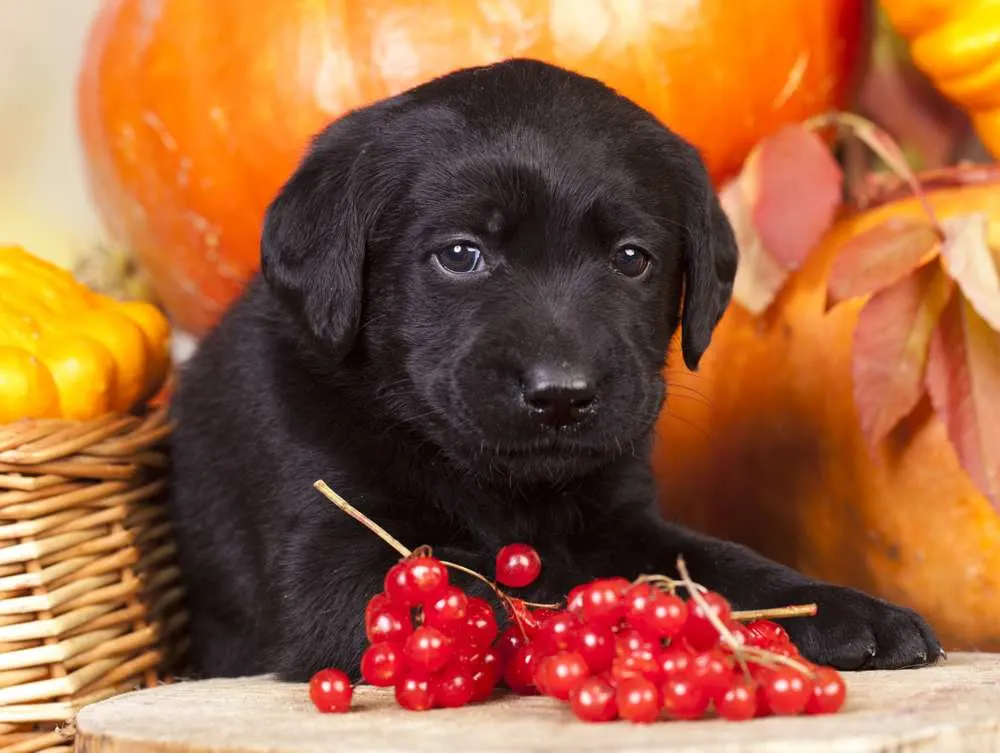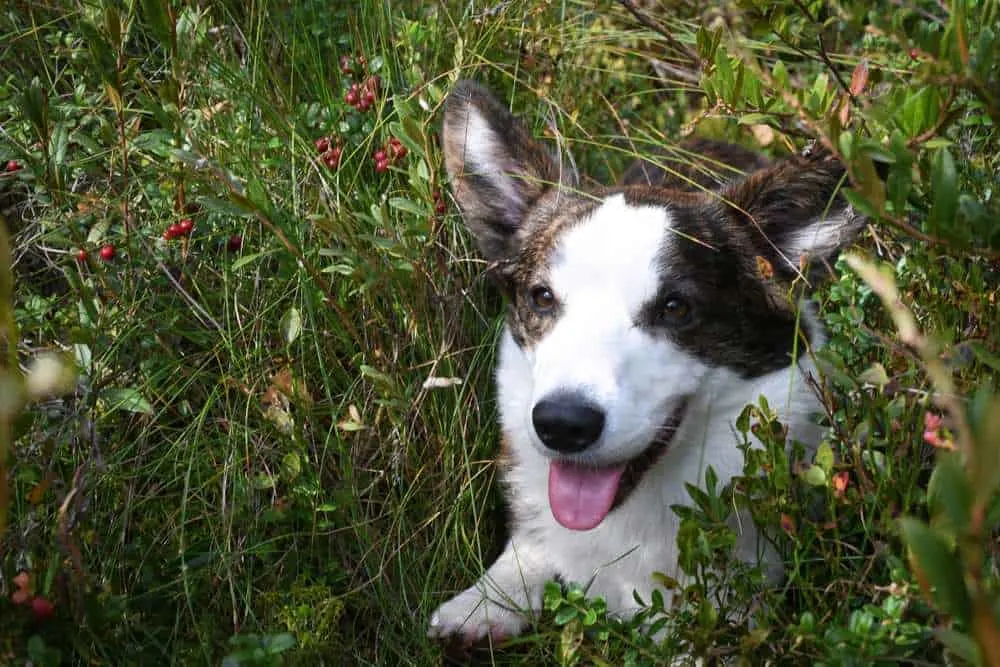Can dogs eat cranberries? Oh boy, can they!
Any dog owner who has ever watched their pup chowing down on mulch or sod or the garden hose knows all too well that cranberries are not off-limits.
But should your dog eat cranberries? Are cranberries safe for dogs? For that matter, are cranberries good for dogs?
Is there anything you should know if your dog eats cranberries? Let’s find out!

Should Dogs Eat Cranberries?
Unless you live on the East Coast or like to grow cranberries in your backyard, the most likely way your pup might get ahold of cranberries is by tucking them into a bag of frozen fruits fresh home from the local grocery store.
The good news here is, you would have more to worry about if your dog eats the plastic bag the cranberries came in than the berries themselves.
Cranberries, in moderation, are basically safe for dogs to eat.
According to the American Kennel Club (AKC), if you want to offer your pooch a cranberry or few as a treat around Thanksgiving time or anytime, there is no essential harm in doing so.
In fact, cranberries even contain some healthy nutrients that can benefit your dog. But the key to receiving those nutritional benefits is in how you offer your dog cranberries.
Are Cranberries Safe For Dogs To Eat?
When you think about the word “cranberries,” you probably automatically think of the popular Thanksgiving sweet treats that contain cranberries. For example, cranberry sauce, cranberry pie, and cranberry compote are all popular holiday treats.
Cranberries are tasty all year round, for that matter. For example, how many shoppers add cranberry juice to their grocery baskets every week without fail? But just because consuming cranberry juice or cranberry sauce is good for you doesn’t mean it is equally good for your dog.
Many of these cranberry recipes and products also contain additives like sugar, flavor agents, or (most dangerous of all) xylitol, a sugar substitute that can be deadly to dogs.
Here, what you need to remember is that cranberries are only healthy for your dog to eat when they are served plain, without sugar or other sweeteners or any extra ingredients.
Can Dogs Eat Dried Cranberries?
According to PetMD, it is safe to feed small quantities of raw cranberries, cooked fresh cranberries, or dried unsweetened cranberries to your dog. Because dried cranberries, even when unsweetened, can be a lot more concentrated than fresh cranberries, they can be harder for your dog to digest.
If you do want to offer dried cranberries to your dog, make sure they are not mixed in with other dried fruits like raisins, which can be toxic to dogs.
Learn more about can dogs eat dried cranberries by clicking here.

How Many Cranberries Can Dogs Safely Eat?
At this point, you might be wondering what “small quantities” of cranberries mean. How much is a small quantity of cranberries?
The size of the dog absolutely matters when it comes to defining what a small quantity looks like.
For a toy or miniature dog breed, a single cranberry might be a small quantity. For a small to medium size dog breed, two or three cranberries might be a small quantity. For a large to giant size dog breed, a small handful of cranberries (five to eight at most) might be a small quantity.
The size and type of cranberries also matter. If the cranberries are very small, you might feed two. If the cranberries are large, you might feed just one.
For dried cranberries, remember these have more concentrated natural fruit sugars and can be harder to break down and digest in your dog’s gastrointestinal system.

Are Cranberries Healthy For Dogs?
Cranberries do have some health benefits for dogs:
Vitamin C
Cranberries are loaded with ascorbic acid, better known as Vitamin C. Vitamin C is great for building up your dog’s immune system and fights off harmful pathogens.
Potassium
Potassium is arguably the most important natural electrolyte for dogs. Some potassium supplements made for dogs even contain natural cranberry extract because cranberries are so high in potassium.
This is especially beneficial for dogs that may suffer from urinary tract infections (UTIs). Studies indicate that the presence of cranberry in the bladder can inhibit harmful bacteria from attaching and colonizing, causing infection.
However, if you do suspect your dog is suffering from any urinary issues, it is important to talk with your dog’s veterinarian first before starting to offer any type of cranberries or cranberry supplements to your dog. It is important to monitor your dog’s potassium levels before adding any supplementation.
Antioxidants
The antioxidants in cranberries can fight systemic inflammation in your dog’s body. In this way, cranberries may be helpful to combat the seasonal allergies and skin issues that many dogs suffer from.
Dietary Fiber
Cranberries, like most fruits, are high in natural insoluble dietary fiber.
Better yet, as Science Daily explains, the particular type of dietary fiber in cranberries is a type of prebiotics (not all plant-based dietary fiber is also probiotics).
Because of this, cranberries can both aid in overall gastrointestinal system function and strengthen and heal the gut microbiome. If your dog suffers from food allergies or G.I. tract issues, feeding small amounts of raw or cooked unsweetened cranberries may help to replenish the good bacteria in the gut.
But this is only the case if your dog can tolerate the extreme tartness of the cranberries themselves, of course. Some dogs digest cranberries without any problem and other dogs find the tartness causes stomach upset. Still, other dogs simply may not like the taste.

How To Feed Cranberries To Dogs?
Dogs today are becoming more prone to food intolerances and food allergies. While cranberries (fresh and unsweetened) are not a known allergen for canines, it is always smarter not to assume your dog won’t be allergic.
The much safer path is to offer your dog a single cranberry (or half a cranberry for a toy or miniature dog breeds) and wait 24 hours to see how it goes. If your dog seems to like the treat and you don’t see any kind of allergic reaction, you can offer another half-cranberry or single cranberry.
If you still don’t see any adverse reaction or intolerance, it is probably safe to add fresh, cooked, or dried whole unsweetened cranberries to your dog’s occasional treat rotation.

Can Cranberries Be Dangerous To Dogs?
As long as you follow the guidelines outlined here and feed only whole raw, cooked, or dried cranberries to your dog in appropriately small quantities, cranberries are typically safe and well-tolerated.
But there can still be exceptions.
One big exception to watch for is choking. Raw whole cranberries can be very hard. While a large or giant breed dog may be able to gulp down a few without any problem, a toy or miniature dog breed could very well choke on these large round fruits.
The best and safest approach here is to cut the raw cranberry into smaller quarters and feed it this way. Even for bigger dogs, don’t give more than one cranberry at a time.

Can Dogs Drink Cranberry Juice?
The majority of cranberry juice products sold commercially today are processed, often with added sweeteners or in mixes with other fruit juices.
While it is not unsafe to allow your dog a taste of fresh unsweetened cranberry juice, overall, it is safest not to serve cranberry juice of any kind to your dog.
Cranberry juice is very concentrated. For this reason, even a tiny portion of fresh juice is like gulping down a whole handful of raw cranberries all at once. It may well upset your dog’s stomach even if it does no other harm.
The wisest move is always to talk with your dog’s veterinarian first before offering cranberries of any kind. There may be other fruits or vegetables that would be healthier and more beneficial overall.
And if your dog has borderline or high potassium levels, you definitely want to avoid offering cranberries, which are naturally high in potassium.
By talking with your dog’s veterinarian first, you can establish which fruits and vegetables would make the healthiest addition to your dog’s regular snack and treat rotation for well-rounded canine nutrition.
Learn More: What Can Dogs Eat? A Comprehensive List Of Dog-safe Foods


